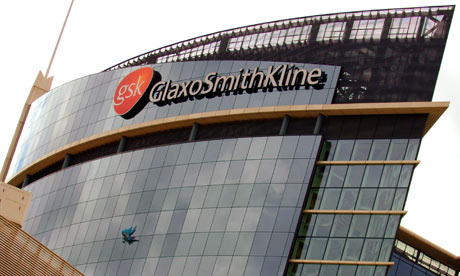it would be understandable if HGS shareholders feel GSK, after 20 years of collaboration with HGS, is forcing the pace for a reason


GlaxoSmithKline would get full rights to two experimental medicines it is developing with Human Genome Sciences if it completes the takeover. Photograph: Fiona Hanson/PA
It's like the old days for Simon Dingemans, the former Goldman Sachs deal-maker who quit a couple of years ago to do a proper job as finance director of GlaxoSmithKline (or pursue a long-held ambition, if you prefer his formal explanation). GSK is on the deal warpath again. It's not a mega-merger — just a $2.6bn (£1.6bn) attempt to buy Human Genome Sciences, a US research partner — but it offers familiar sport in the form of brinkmanship and shows of force.
Having seen its $13-a-share offer dismissed last month, GSK today launched a hostile tender offer at the same price. In other words, it's going over the head of HGS's board and inviting shareholders to sell. Indeed, GSK is turning up the heat further. "It is important for HGS shareholders to understand that GSK is committed to proceeding with its offer," said the UK firm's statement, with just a hint of menace.
But it would be understandable if those shareholders feel GSK, after 20 years of collaboration with HGS, is forcing the pace for a reason. The takeover bid has arrived at a moment when putting a fair value on HGS is especially hard (just look at the share price: $30 a year ago; $7 before GSK's offer).
The main attraction — Benlysta, a treatment for the auto-immune disease lupus — was launched only last year and its long-term sales prospects are unclear. There are also two other drugs in development — a diabetes drug in final-stage trials and a heart disease treatment that is two years away from the market. How should they be valued? Drugs in development can fall at the final hurdle, as Roche proved only this week, yet surely their value is more than zero.
HGS investors will suspect that GSK has the inside track after so many years of collaboration. On the other hand, HGS' board, having scratched around for saviours, has found none so far. That's not a surprise. GSK and HGS have a royalty-sharing agreement so it's hard to imagine Pfizer, say, wishing to step into HGS's shoes.
There is still time for a negotiated settlement. GSK remains "willing to meet and review its offer with HGS at any time," which sounds like an invitation to the HGS board to roll over in exchange for a face-saving improvement in terms. Then again, the words may be a mere courtesy.
One has to applaud both GSK's aggression and opportunism. It may bag a bargain even it ends up tweaking its bid — the savings from taking HGS in-house are put at $200m. Dingemans' former employers would be proud of the display of tactical nous. On this occasion, though, Goldman has been called in to help the defence.

No comments:
Post a Comment